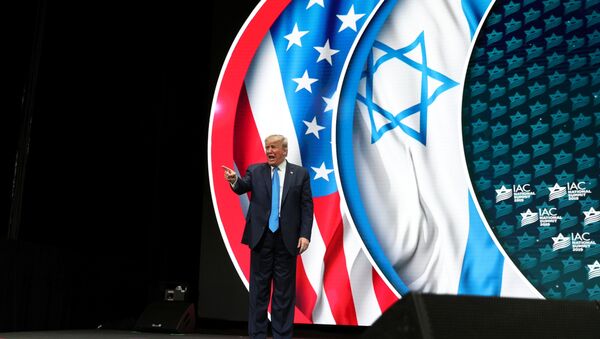Speaking on Saturday at the 2019 IAC National Summit in Florida, President Donald Trump said that people in the United States should love Israel more.
“We have to get the people of our country, of this country, to love Israel more, I have to tell you that. We have to do it. We have to get them to love Israel more", Trump said.
POTUS also suggested that there are some American Jews who do not “love Israel enough”.
“It’s truly my honour to be here this evening, to celebrate our progress, to deepen the incredible partnership between the United States and Israel, and it suffered greatly in the last administration. I don’t think they liked Israel too much, I’m sorry", Trump said.
The US president said that Tel Aviv has never had a “better friend in the White House” than himself, claiming that unlike his predecessors, he has kept his promises to the Jewish people.
His remarks have sparked outrage on social media, with many saying that the US president cannot tell Jewish people they "don't love Israel enough":
This irreligious, amoral gentile is telling Jewish people that they don't love Israel enough. https://t.co/xvs8H9SgIT
— David Atkins (@DavidOAtkins) December 8, 2019
Excuse me @realDonaldTrump, I don’t love Israel enough? https://t.co/89AGL9pewK
— Cary Wolovick (@cwolovick) December 8, 2019
WTF? The Jews don't love Israel enough? SMH. This idiot.. https://t.co/8VEHFOk47F
— MicheleH, LCSW (@LcswMicheleh) December 8, 2019
Jewish people don’t “love Israel enough.” Is that what that old fool said?
— Sara Hammond (@ArizonaWildcat) December 8, 2019
The former head of the National Jewish Democratic Council, Aaron Keyak, has even slammed Trump's comments as "anti-Semitic".
“Trump’s insistence on using anti-Semitic tropes when addressing Jewish audiences is dangerous and should concern every member of the Jewish community — even Jewish Republicans", Keyak said.
Over the past two years, Trump has made a number of gestures toward Israel that previous US presidents refused to make, including recognising Jerusalem as the capital of Israel and the disputed Golan Heights, which were seized from Syria during the 1967 Six-Day War, as sovereign Israeli territory.
In November, Secretary of State Mike Pompeo made a dramatic statement, announcing that the United States would no longer abide by a 1978 State Department legal opinion that Jewish settlements in the West Bank violate international law.
The sudden change of heart in US foreign policy has raised more questions about the success of the Trump administration's peace plan for the Middle East, which includes a series of economic and political measures, but excludes a two-state solution.


